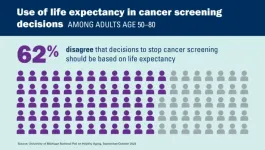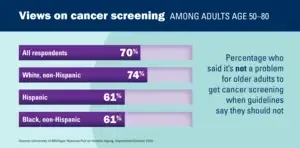(Press-News.org) A majority of older adults disagree with the idea of using life expectancy as part of guidelines that say which patients should get cancer screenings such as mammograms and colonoscopies, a new poll finds.
In all, 62% of people aged 50 to 80 said that national guidelines for stopping cancer-detecting tests in individual patients should not be based on how long that person might have left to live, according to new results from the University of Michigan National Poll on Healthy Aging.
That goes against a trend in such guidelines, which national organizations develop based on medical evidence. Guidelines mainly aim to help health care providers decide when to recommend different tests to a patient – but they also play a role in insurance coverage decisions.
Guidelines have started to factor in life expectancy because the risks from some screening tests increase with age, and because studies show that a person needs to live about 10 years to get the full benefit of finding cancer early.
But the poll finds that even among older adults who can be characterized as “medical minimizers” when it comes to taking action on their own health because they prefer to avoid medical intervention unless it is necessary, a majority (57%) disagreed with the idea of using life expectancy in cancer screening guidelines.
Meanwhile, 70% of all older adults polled don’t consider it a problem if some older adults get cancer screenings even when guidelines don’t recommend them.
The poll team also asked specifically about the 10-year life expectancy limit, which has already become part of some guidelines. In all, 55% of those polled said it was about right, but 27% said it was too short.
The poll is based at the U-M Institute for Healthcare Policy and Innovation and supported by AARP and Michigan Medicine, the University of Michigan’s academic medical center.
“Personalizing cancer screening decisions to each patient’s health situation, rather than using one-size-fits-all age cutoffs, could benefit both very healthy and less healthy patients in different ways,” said Brian Zikmund-Fisher, Ph.D., a health care decision-making researcher and professor from the U-M School of Public Health who worked on the poll. As a result, he notes, “many guidelines recommend considering the patient’s life expectancy.”
“But when it comes to a discussion between a health care provider and an individual patient, personalizing the cancer screening decision essentially means talking about how long that person is expected to live," he added. “It also means sometimes deciding that not doing a screening is actually the healthiest approach.”
Zikmund-Fisher co-directs the U-M Center for Bioethics and Social Sciences in Medicine, and serves as editor-in-chief of the journals Medical Decision Making and MDM Policy & Practice.
The new findings have special timeliness because of a federal court case that could lead to the end of required insurance coverage for cancer screenings and other preventive care based on national guidelines.
“Right now, insurance plans must cover the cost of cancer screenings for people in the groups covered by guidelines set by the U.S. Preventive Services Task Force,” explained poll director Jeffrey Kullgren, M.D., M.P.H., M.S., an associate professor of internal medicine at Michigan Medicine and physician and researcher at the VA Ann Arbor Healthcare System. “Depending on how the courts eventually rule, insurance coverage of some cancer screenings could end for some older adults, because insurers would be allowed to set their own standards for coverage and not have to abide by guidelines.”
In addition, he noted, cancer screening guidelines change if new evidence about who gets the most benefit from them emerges. For instance, a draft USPSTF guideline that may take effect soon lowers the age for the start of screening mammograms to 40, while continuing to find insufficient evidence for screening women over 75.
More poll findings
The poll allowed respondents to say whether they disagreed somewhat, or disagreed strongly, with the idea of screening guidelines using life expectancy. In all 26% strongly disagreed with this. Strong disagreement was more common among women than men (30% vs. 21%) and women were more likely than men to disagree with use of life expectancy in guidelines about both continuing screening (62% vs 50%) and stopping screening (66% vs 57%).
Strong disagreement with use of life expectancy in guidelines about stopping screening was also higher among Black poll respondents than among white or Hispanic respondents (37% vs. 24% vs 28%).
The poll also shows that 74% of white respondents don’t see it as a problem if older adults get screened for cancer against the guidelines that apply to them – compared with 61% of Black and 61% of Hispanic respondents. Zikmund-Fisher notes that white, non-Hispanic Americans tend to have the most access to cancer screening to begin with.
The “medical minimizers” group of poll respondents were those who answered that they tend to lean towards waiting and seeing if action is needed when it comes to situations with their own health where the need for action is not clear, and that they tend to lean towards doing only what is necessary in health decisions.
While 57% of this group disagrees with using life expectancy in cancer screening guidelines, it was much lower than the 73% of those characterized as “medical maximizers,” but not statistically different from the 62% of those whose answers were somewhere in the middle.
The poll report is based on findings from a nationally representative survey conducted by NORC at the University of Chicago for IHPI and administered online and via phone in January 2023 among 2,563 adults aged 50 to 80. The sample was subsequently weighted to reflect the U.S. population.
Read past National Poll on Healthy Aging reports and about the poll methodology
END
Should older adults with fewer years to live keep getting cancer screenings? Poll explores attitudes
Majority of people over 50 disagree with using life expectancy in guidelines for cancer screening tests
2023-09-28
ELSE PRESS RELEASES FROM THIS DATE:
Elk hoof disease likely causes systemic changes
2023-09-28
PULLMAN, Wash. – Elk treponeme-associated hoof disease, previously thought to be limited to deformations in elks’ hooves, appears to create molecular changes throughout the animal’s system, according to epigenetic research from Washington State University.
The findings, published in the journal Scientific Reports, also suggest those changes may be heritable. It remains to be seen though whether this means subsequent generations of elk may be more, or less, prone to catching the devastating disease that severely impairs the elk’s ability to find food and escape predators.
“It’s not just the ...
Wearable device data reveals that reduced sleep and activity in pregnancy is linked to premature birth risk
2023-09-28
A lack of sleep and reduced physical activity during pregnancy are linked to risk of preterm birth, according to new research led by the Stanford School of Medicine.
In the study, which will publish online Sept. 28 in npj Digital Medicine, the researchers collected data from devices worn by more than 1,000 women throughout pregnancy. With a machine learning algorithm, the scientists sifted through participants’ activity information to detect fine-grained changes in sleep and physical activity patterns.
“We showed that an artificial intelligence algorithm can build a ‘clock’ of physical activity and sleep ...
Predicting condensate formation by cancer-associated fusion oncoproteins
2023-09-28
(Memphis, Tenn – September 28, 2023) Many cancers are caused by fusion oncoproteins, molecules that aberrantly form when a rearrangement of DNA results in parts of two different proteins being expressed as one. Several fusion oncoproteins spontaneously form condensates inside cells that promote cancer development. New research by St. Jude Children’s Research Hospital established a method to study this biophysical process in cells, then used that information as a launchpad to predict the behavior of other fusion oncoproteins. The findings, which offer insight into ...
Biological particles play crucial role in Arctic cloud ice formation
2023-09-28
An international team of scientists from Sweden, Norway, Japan, and Switzerland, has presented research findings that reveal a crucial role of biological particles, including pollen, spores, and bacteria, in the formation of ice within Arctic clouds. These findings, published today in Nature Communications, have far-reaching implications for climate science and our understanding of the rapidly changing Arctic climate.
The research, whose outcomes have unveiled the connection between biological particles and the formation of ...
Fitness and staving off weight gain may be more important than weight loss for preventing kidney disease in obese adults, Drexel study says
2023-09-28
Fitness and Staving Off Weight Gain May Be More Important than Weight Loss for Preventing Kidney Disease in Obese Adults, Drexel Study Says
As obesity is a contributing factor to chronic kidney disease, weight loss can help mitigate a patient’s risk. But new research suggests that fitness and preventing weight gain could actually play a more important role in reducing risk than weight loss. The findings were published today in the journal Obesity from researchers at Drexel University’s College of Medicine and Dornsife School of Public Health.
The researchers followed 1,208 overweight ...
Child Development journal Q&A: Music intervention programs can enhance parent and baby language interactions
2023-09-28
Previous research shows that conversational turns (interactive conversations) between parents and children are important for a child’s long-term language development and academic achievement and that these conversations can be enhanced via parent-coaching language interventions. The neural networks responsible for language develop rapidly even before a child can talk, making these interactive conversations especially important during infancy.
Music is an engaging and social experience between parents and children that is often part of daily routines during infancy. Emerging literature also documents links between music experiences and child language outcomes. Researchers ...
New program helps improve toddlers’ self-control skills and healthy eating habits
2023-09-28
Two of the best predictors of life-long health and well-being are early childhood self-control skills and healthy eating habits. A new program that teaches parents how to cook with their 2-year-olds is helping toddlers excel on both fronts. Doing things like stirring ingredients together without spilling and singing a song while something is in the microwave helps toddlers learn multiple important self-control skills, like paying attention, controlling their bodies, waiting patiently, and cooperating with their parents. Toddlers also get excited about being involved in the “grown-up” activity and are more likely to try the new foods they help make. Previous research has shown that ...
Cannabis use disorder may be linked to increased risk of cardiovascular disease
2023-09-28
A new study has found that Canadian adults with cannabis use disorder appear to have an approximately 60% higher risk of experiencing their first heart attack, stroke, or other major cardiovascular event than those without cannabis use disorder.
The study, published in Addiction, measured the association between problematic marijuana use and the first-time occurrence of adverse cardiovascular disease events such as heart attack, stroke, cardiac dysrhythmias, and peripheral vascular disease.
Researchers used five Canadian health databases to create a cohort of nearly 60,000 participants, half with a cannabis use disorder ...
Fish reveal cause of altered human facial development
2023-09-28
Some substances in medicines, household items and the environment are known to affect prenatal child development. In a study published in Toxicological Sciences, researchers tested the effects of five drugs (including caffeine and the blood thinner warfarin) on the growth of zebrafish embryos. They found that all five had the same effect, impairing the migration of bone-forming cells which resulted in the onset of facial malformation. Zebrafish embryos grow quickly, are transparent and develop outside of the parent’s body, ...
How safe is your sushi?
2023-09-28
Sushi has become everyday fare in Norway and elsewhere around the globe, and many people opt for sashimi and other raw fish when they want to treat themselves to something tasty.
It is important to emphasise here that, as a general rule, it is completely safe to eat this type of food in Norway. However, despite the fact that sushi can be delicious, it also carries a health hazard, both for individuals and for society at large.
“Bacteria in sushi, sashimi and cold-smoked fish products can pose a risk to people who eat such foods frequently, especially people with weak immune systems, children and the elderly,” says Hyejeong Lee.
She recently completed her PhD at the Department ...
LAST 30 PRESS RELEASES:
Microalgae-derived biochar enables fast, low-cost detection of hydrogen peroxide
Researchers highlight promise of biochar composites for sustainable 3D printing
Machine learning helps design low-cost biochar to fight phosphorus pollution in lakes
Urine tests confirm alcohol consumption in wild African chimpanzees
Barshop Institute to receive up to $38 million from ARPA-H, anchoring UT San Antonio as a national leader in aging and healthy longevity science
Anion-cation synergistic additives solve the "performance triangle" problem in zinc-iodine batteries
Ancient diets reveal surprising survival strategies in prehistoric Poland
Pre-pregnancy parental overweight/obesity linked to next generation’s heightened fatty liver disease risk
Obstructive sleep apnoea may cost UK + US economies billions in lost productivity
Guidelines set new playbook for pediatric clinical trial reporting
Adolescent cannabis use may follow the same pattern as alcohol use
Lifespan-extending treatments increase variation in age at time of death
From ancient myths to ‘Indo-manga’: Artists in the Global South are reframing the comic
Putting some ‘muscle’ into material design
House fires release harmful compounds into the air
Novel structural insights into Phytophthora effectors challenge long-held assumptions in plant pathology
Q&A: Researchers discuss potential solutions for the feedback loop affecting scientific publishing
A new ecological model highlights how fluctuating environments push microbes to work together
Chapman University researcher warns of structural risks at Grand Renaissance Dam putting property and lives in danger
Courtship is complicated, even in fruit flies
Columbia announces ARPA-H contract to advance science of healthy aging
New NYUAD study reveals hidden stress facing coral reef fish in the Arabian Gulf
36 months later: Distance learning in the wake of COVID-19
Blaming beavers for flood damage is bad policy and bad science, Concordia research shows
The new ‘forever’ contaminant? SFU study raises alarm on marine fiberglass pollution
Shorter early-life telomere length as a predictor of survival
Why do female caribou have antlers?
How studying yeast in the gut could lead to new, better drugs
Chemists thought phosphorus had shown all its cards. It surprised them with a new move
A feedback loop of rising submissions and overburdened peer reviewers threatens the peer review system of the scientific literature
[Press-News.org] Should older adults with fewer years to live keep getting cancer screenings? Poll explores attitudesMajority of people over 50 disagree with using life expectancy in guidelines for cancer screening tests





